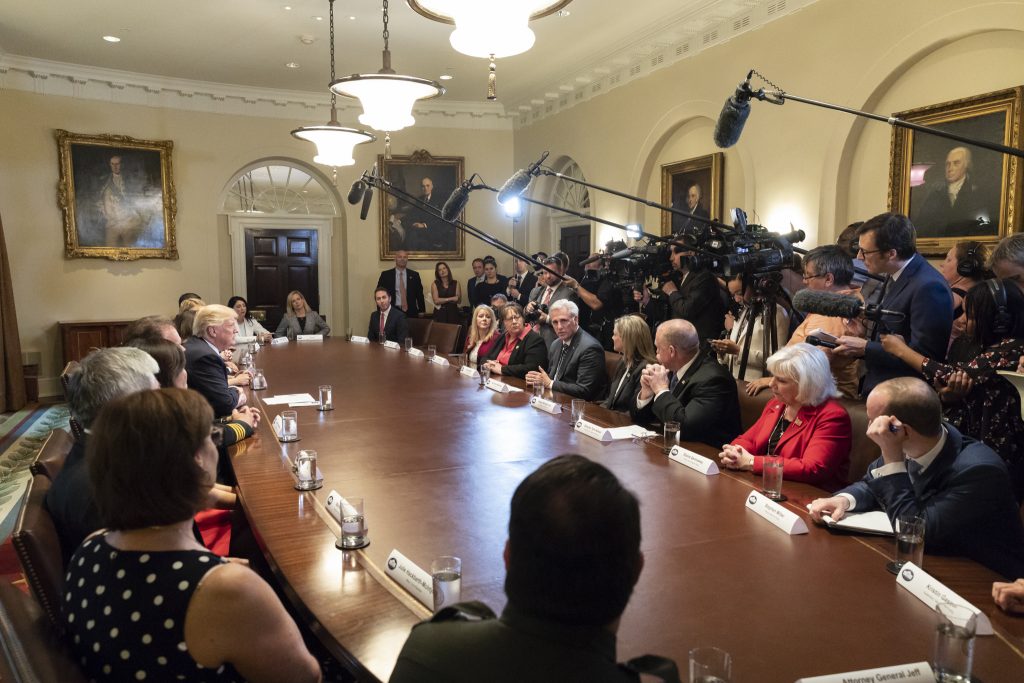
President Donald J. Trump participates in a California Sanctuary State roundtable | May 16, 2018 (Official White House Photo by Andrea Hanks)
The Trump administration recently suffered a blow when U.S. District Court Judge Edgardo Ramos in Manhattan ruled in favor of a petition by New York City and the state of New York (and six other states). Judge Ramos determined the federal Government was not permitted to hold back millions of dollars in grant money from the states and cities operating as “sanctuary” jurisdictions.
The lawsuit was led by New York Attorney General Barbara Underwood and the following six states later joined the suit: New Jersey, Rhode Island, Connecticut, Massachusetts, Washington state and Virginia.
The ruling comes almost two years after January 2017, when recently elected President Donald Trump said sanctuary communities would not be eligible to receive federal grants in many circumstances including “failing to comply with specific conditions” (outlined below).
Following Trump’s order, the Justice Department instituted new requirements to the Edward Byrne Memorial Justice Assistance Grant Program, which supports state and local governments and was specifically named in the suit.
Trump’s Executive Order Against Sanctuary Money
One new requirement was the stipulation that when an illegal immigrant was released from custody, the local officials would notify federal agents, who would then question inmates regarding their status in the country.
Another requirement of the executive order was that the local governments reportedly had to agree not to set limits on giving immigration officials citizenship information about anyone. After the executive order was announced, then U.S. Attorney General Jeff Sessions said the aim of the new order was to “encourage these ‘sanctuary’ jurisdictions to change their policies and partner with federal law enforcement to remove criminals.”
Department of Justice spokesman, Steve Stafford, said, “The federal government is not asking the states or anyone else to enforce our immigration laws” in defense of the Trump administration’s executive order. Stafford further said the order is simply asking sanctuary jurisdictions to stop obstructing federal law enforcement, and used the Constitution to defend himself when stating that sanctuary jurisdictions are making the “absurd claim” that they should continue to receive federal law enforcement funding despite their efforts to thwart the efforts of federal law enforcement in regard to illegal immigrants.
Judge Ramos and those who see his ruling as a victory feel otherwise.
Judge Ramos’ Ruling Celebrated by Many
Judge Ramos’ ruling agreed with the states’ and cities’ argument that the newly imposed requirements went against the constitutional limits on the administration’s ability to control spending decisions. It also exceeded constitutional limits on federal power over states. Ramos wrote that the information-sharing requirement of the Trump administration’s order “impinges on (the states’ and city’s) sovereign authority and their citizens’ liberty to be regulated under their preferred state and local policies.”
New York AG Barbara Underwood and New York City Mayor Bill de Blasio publicly announced that Judge Ramos’ decision to block President Trump from withholding public safety funds from sanctuary communities was a “huge victory.”
AG Underwood tweeted, “The Trump administration simply does not have the right to require state and local police to act as federal immigration agents.” In a press release she is quoted as saying, “The Trump administration’s attempt to withhold these vital funds was nothing more than a political attack at the expense of our public safety.”



Leave a Comment